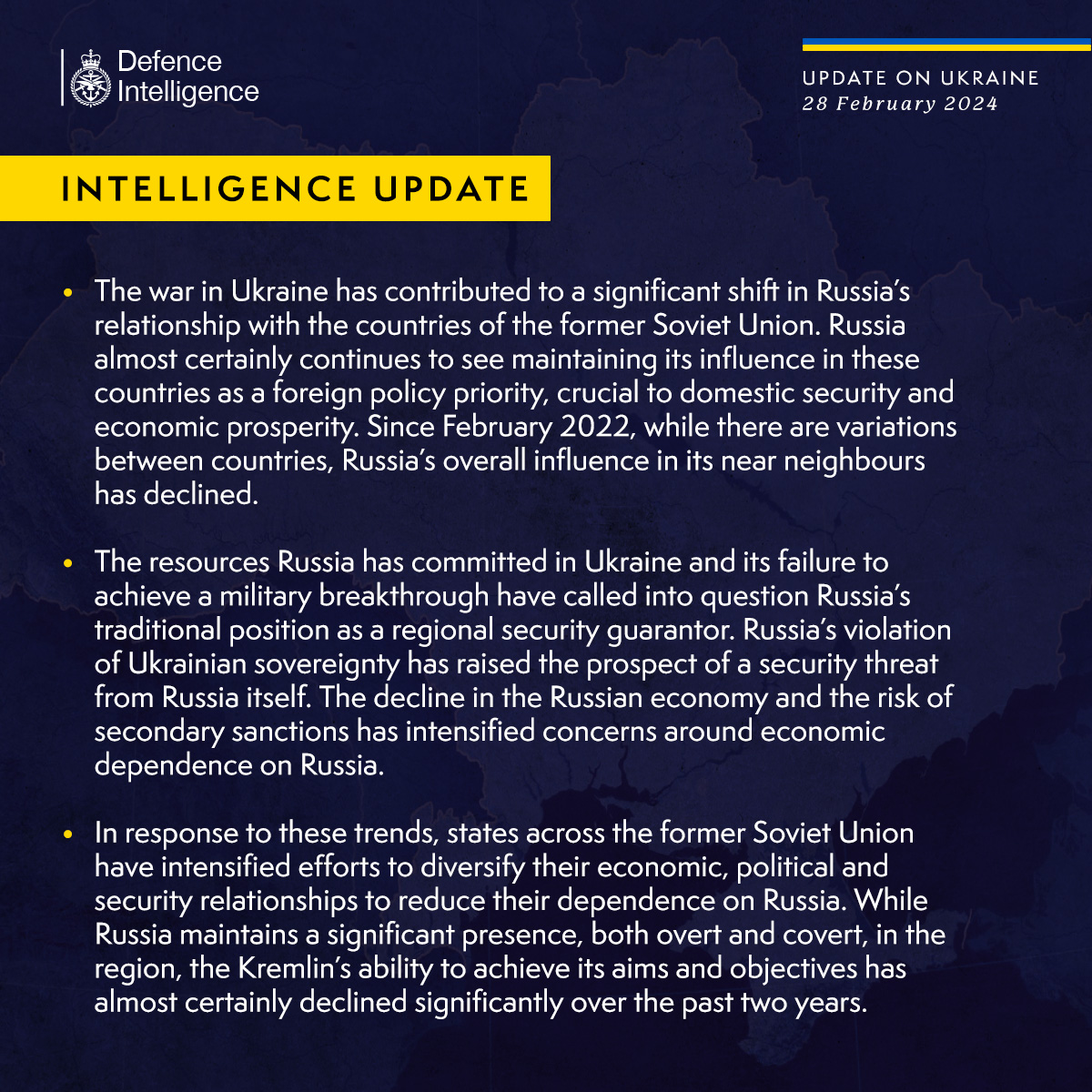The conflict in Ukraine has catalyzed a notable transformation in Russia’s interaction with former Soviet Union countries. The latest report from UK Defense Intelligence highlights a significant downturn in Russia’s overall influence on its neighboring nations since February 2022.
The UK MoD, in its latest intelligence update on February 28, claimed that Russia’s ongoing commitment to resources in Ukraine, coupled with its inability to achieve a decisive military breakthrough, has led to doubts about its traditional role as a regional security guarantor.
Moreover, Russia’s violation of Ukrainian sovereignty has not only raised concerns about security threats but has also intensified worries regarding economic dependence on Russia, particularly with the decline of the Russian economy and the looming risk of secondary sanctions.
In response to these developments, former Soviet Union states have ramped up efforts to diversify their economic, political, and security ties, aiming to lessen their reliance on Russia, the report added.
The Ministry further pointed out that despite Russia’s continued presence in the region, both overt and covert, the Kremlin’s effectiveness in achieving its strategic objectives has markedly diminished over the past two years.

The observations made by the UK Ministry of Defense align with assessments from numerous experts, who have been highlighting a trend among Russia’s neighboring countries of distancing themselves from Moscow’s influence.
This shift extends beyond geopolitics and reflects profound societal changes as many nations reevaluate their ties with Russia and move away from romanticized notions of their Soviet heritage.
This societal evolution is fueling internal pressures for political reforms. Additionally, Russian cultural sway is diminishing as alternative perspectives gain traction, driven by a mix of domestic and foreign influences.
Particularly noteworthy is the exposure of the younger generations to a diverse array of cultural inputs, eroding the dominance of Russian culture and creating space for competing ideologies from regions such as Turkey, the Persian Gulf, and Europe.
Former Soviet Republics Seek Detachment
Following the dissolution of the Soviet Union in 1991, the landscape of Eastern Europe and Central Asia underwent a significant transformation.
The newly independent states, including Armenia, Azerbaijan, Belarus, Estonia, Georgia, Kazakhstan, Kyrgyzstan, Latvia, Lithuania, Moldova, Russia, Tajikistan, Turkmenistan, Ukraine, and Uzbekistan, emerged from the wreckage of the USSR.
Initially, Russia, the largest successor state to the Soviet Union, struggled to relinquish full sovereignty to the 14 non-Russian countries.
While some, like Estonia, Latvia, and Lithuania, swiftly pursued Western integration, leading to their eventual membership in the European Union and NATO, Russia maintained its dominant position over most of the newly independent nations.
Yet, over the past three decades, relations between Russia and its former Soviet counterparts have fluctuated. Some countries have sought to continue maintaining strong ties with Moscow, but others have aimed to distance themselves from Russian influence.
Russian President Vladimir Putin has openly expressed his desire to restore Russian influence across its former imperial domains, lamenting the dissolution of the USSR as the “disintegration of historical Russia.”
Since the full-scale invasion of Ukraine by Russian forces, several ex-Soviet republics have reevaluated their relationship with Moscow.
For example, Kazakhstan opted not to hold a military parade in 2022 commemorating the Soviet interpretation of its World War II victory.
While Kazakhstan has refrained from joining Western sanctions against Russia, it has also refused to aid the Kremlin, asserting that it will not allow Russia to use Kazakh territory to evade sanctions.
Similarly, in the South Caucasus region, Russia’s stature has been diminished by its involvement in the Ukraine conflict and the perceived failures of its military. Historically serving as a peacekeeper and mediator between Azerbaijan and Armenia, Russia’s inability to halt renewed fighting in the region has prompted Armenia to reassess its ties with Moscow.
As Russian influence declines, the Armenian government has bolstered cooperation with the United States and the European Union, even opening a new EU Mission in Yerevan.
Additionally, Armenia has begun distancing itself from the Collective Security Treaty Organization (CSTO), a Russia-led military bloc comprising six former Soviet republics.
In various ex-Soviet states like Armenia, Georgia, Kyrgyzstan, and Moldova, protests have erupted in recent years, demanding reforms to post-Soviet state institutions perceived to serve the political elite rather than citizens.
Despite these shifts, Putin maintains a close relationship with Belarusian President Alexander Lukashenko, who relies on Russian support to maintain power, particularly following the contentious 2020 election, which is widely criticized as fraudulent.
Yet, public sentiment in Belarus reveals discontent about the close ties to Moscow. In a notable turn of events at the onset of the Ukraine invasion, Belarusian railway workers orchestrated a bold act of sabotage, targeting Russia’s supply of equipment to Ukraine.
This daring move significantly affected Russian logistics, hampering the Kremlin’s endeavors to push forward troops and supplies. The incident not only underscores the complexities of public opinion in Belarus but also highlights instances of resistance within the country against actions aligning too closely with Russian interests.
- Contact the author at ashishmichel(at)gmail.com
- Follow EurAsian Times on Google News